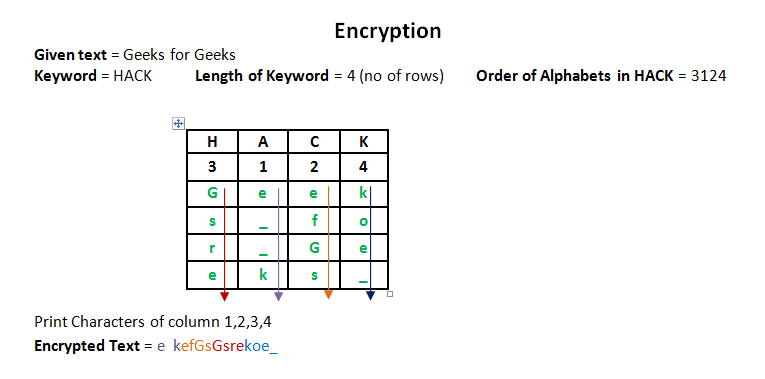Simple Substitution Cipher Generate Modified Alphabet Key Python
Posted : admin On 18.04.2020Jan 05, 2019 Tag: cipher Baudot-Murray Code (ITA2). The Affine cipher is a monoalphabetic substitution cipher that uses a simple numeric mapping algorithm to generate a ciphertext alphabet. For the purposes of this explanation we must refer to the indices of alphabetic characters starting from 0. The first is that the Dancing Men cipher is a simple. Get program for caesar cipher in C and C for encryption and decryption. What is Caesar Cipher? It is one of the simplest encryption technique in which each character in plain text is replaced by a character some fixed number of positions down to it.
- Simple Substitution Cipher Generate Modified Alphabet Key Python Number
- Simple Substitution Cipher Generate Modified Alphabet Key Python Download
| defencrypt(plaintext, key): |
| key_length=len(key) |
| key_as_int= [ord(i) foriinkey] |
| plaintext_int= [ord(i) foriinplaintext] |
| ciphertext=' |
| foriinrange(len(plaintext_int)): |
| value= (plaintext_int[i] +key_as_int[i%key_length]) %26 |
| ciphertext+=chr(value+65) |
| returnciphertext |
| defdecrypt(ciphertext, key): |
| key_length=len(key) |
| key_as_int= [ord(i) foriinkey] |
| ciphertext_int= [ord(i) foriinciphertext] |
| plaintext=' |
| foriinrange(len(ciphertext_int)): |
| value= (ciphertext_int[i] -key_as_int[i%key_length]) %26 |
| plaintext+=chr(value+65) |
| returnplaintext |
commented Jan 3, 2018
I think there are limitations here with lower case and capital letters. You'd need to check for I wrote one that handles all default ASCII characters (95): For example: |

commented Jan 3, 2018 • edited
edited

commented Mar 6, 2018
@flipperbw , |
commented May 1, 2018
I implemented this some years ago, along with a tabula recta generator so you can do it by hand (for fun!) |
commented Jan 10, 2020
Hello! |
commented Jan 10, 2020
It's just the return text, that one by one figures out the proper character to return given the key. It's been a while since I wrote this snippet but if it can find a match of an ascii character, itll convert that, else it will leave it alone. |
| defencrypt(plaintext, key): |
| key_length=len(key) |
| key_as_int= [ord(i) foriinkey] |
| plaintext_int= [ord(i) foriinplaintext] |
| ciphertext=' |
| foriinrange(len(plaintext_int)): |
| value= (plaintext_int[i] +key_as_int[i%key_length]) %26 |
| ciphertext+=chr(value+65) |
| returnciphertext |
| defdecrypt(ciphertext, key): |
| key_length=len(key) |
| key_as_int= [ord(i) foriinkey] |
| ciphertext_int= [ord(i) foriinciphertext] |
| plaintext=' |
| foriinrange(len(ciphertext_int)): |
| value= (ciphertext_int[i] -key_as_int[i%key_length]) %26 |
| plaintext+=chr(value+65) |
| returnplaintext |
commented Jan 3, 2018
I think there are limitations here with lower case and capital letters. You'd need to check for I wrote one that handles all default ASCII characters (95): For example: |
commented Jan 3, 2018 • edited
edited
commented Mar 6, 2018
@flipperbw , |
commented May 1, 2018
I implemented this some years ago, along with a tabula recta generator so you can do it by hand (for fun!) |
commented Jan 10, 2020
Hello! |
Simple Substitution Cipher Generate Modified Alphabet Key Python Number
commented Jan 10, 2020
Simple Substitution Cipher Generate Modified Alphabet Key Python Download
It's just the return text, that one by one figures out the proper character to return given the key. It's been a while since I wrote this snippet but if it can find a match of an ascii character, itll convert that, else it will leave it alone. |
